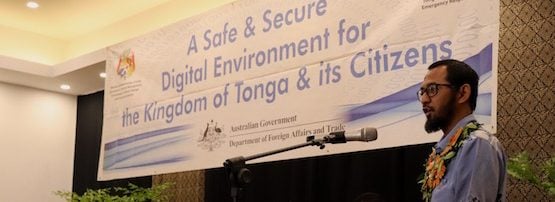
Recent developments to expand Internet connectivity and accessibility within the Pacific region have led to a greater need for smaller island economies to address their cybersecurity shortcomings.
Although the majority of cyberattacks currently target large corporations and governments, we cannot continue to be complacent about future attacks; in the past three to five years there has been little effort by smaller island economies in the Pacific to implement even basic safe-use mechanisms nor user awareness campaigns to inform and update people about online safety measures.
Happily this has changed recently, with recent initiatives and events organized by international organizations and networks including APNIC, the International Telecommunication Union, Australian Government, Commonwealth Telecommunications Organization, Pacific ICT Regulatory Resource Centre and the UK Safer Internet Centre, which have sought to build capacity and emphasize cooperation among smaller island economies to address cybersecurity challenges.
Safer Internet Day
One such event is the Safer Internet Day (SID), which was started in 2004 as an initiative of the EU SafeBorders project and has since become a significant awareness day globally.
SID 2018 saw a diverse range of events and campaigns carried out in Fiji — focused on the theme ‘Create, Connect and Share Respect: a better Internet starts with you’ — to help promote the safe, responsible, and positive use of digital technologies for children.
Safer Internet Day Fiji worked on promoting awareness programs on Internet safety for kids, with the aim to educate children online, teaching basic measures and safe user behaviour.
#cybersecurity approaches in the Pacific. Find out more from the 🇫🇯 Fiji #SaferInternetDay Committee: https://t.co/NwOlAy6Rxi #SID2018 pic.twitter.com/JgMZexIYyL
— Safer Internet Day (@safeinternetday) May 22, 2018
Bigger and better activities are planned for SID 2019, which will be held on 5 February 2019.
Pacific Cyber Security Operational Network (PaCSON)
PaCSON is a recently established initiative that aims to create a network of cybersecurity incident response professionals from relevant organizations and Computer Emergency Response Teams (CERTs) in the Pacific region.
The inaugural PaCSON Annual General Meeting (AGM) was held in Brisbane, Australia, earlier this year, and welcomed 20 participants from 14 economies in the Pacific (Australia, Cook Islands, Fiji, Kiribati, Marshall Islands, New Zealand, Niue, Palau, Papua New Guinea, Samoa, Solomon Islands, Tokelau, Tonga and Vanuatu). Attendees participated in a cybersecurity awareness workshop, advanced persistent threat incident response exercise, and cybersecurity information exchange session.
Congrats to #PaCSON on its inaugural meeting last week! Great example of a pragmatic, action-oriented effort to boost security (w/ a topnotch logo to boot). Appreciate the chance to collaborate w/ friends in the dynamic & jovial Pacific #cyber community https://t.co/JjlVxCAGkg pic.twitter.com/FGEPbSEN4U
— Klee Aiken (@a_Klee) May 9, 2018
As one of the participants, I found it not only a useful development exercise but also a great way for us cybersecurity professionals to meet each other face-to-face and build trusted relationships—the human side of network security is just as important as the software and technology that can help us to monitor, manage, mitigate and diagnose cyberattacks.
PaCSON highlighted to us the lack of actual cyber development in the Pacific, and through the efforts and assistance of the Australian Government, we are now working towards addressing our own specific needs and advancing cybersecurity to a whole new level.
Developing the capacity of CERTs and Law Officers in the Pacific
In May this year, Tonga hosted a regional CERT training workshop facilitated by APNIC, with support from the Australian Government.
Tonga was the first economy in the Pacific region (apart from Australia and New Zealand) to establish a national CERT (2016); Papua New Guinea and Vanuatu have followed suit, the latter just last month.
APNIC has been actively involved in the establishment and development of the above-mentioned CERTs, as well as conducting regular network security trainings for organizations and communities.
Tonga also hosted the Second Annual Pacific Islands Law Officers’ Network (PILON) Cybercrime Workshop in June, with assistance from the Australian Government and the Council of Europe Global Action against Cybercrime Project (GLACY+), which representatives from Fiji participated in.
This year’s theme – ‘Combatting Online Child Abuse in the Pacific’ mainly focused on the legislative aspects to combat online child abuse and cyberbullying, investigating and prosecuting online child abuse cases and the role of the Pacific in combatting online child abuse.
Still work to be done
These efforts aside, Pacific economies are still a long way from having stringent policies to curb cybersecurity issues. Firm commitment needs to be shown towards building cyber resilience, and safeguarding plans must be implemented and included within government ICT strategies for more effectiveness.
Elvin Prasad works as a Senior ICT Engineer in the Ministry of Communications, Fiji.
The views expressed by the authors of this blog are their own and do not necessarily reflect the views of APNIC. Please note a Code of Conduct applies to this blog.
